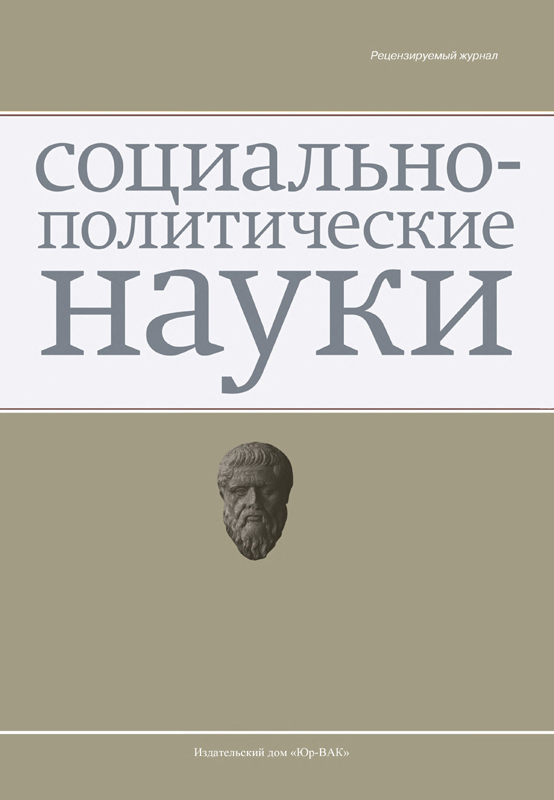Creating of Distinctions “Our-Foreign” in the Issue of “Orthodoxification” of the Western Outskirts of the Russian Empire in the XIX Century
- Authors: Markova N.M.1
-
Affiliations:
- Vladimir State University named after Alexander and Nikolay Stoletovs (VLSU)
- Issue: Vol 12, No 2 (2022)
- Pages: 184-189
- Section: Articles
- URL: https://journals.eco-vector.com/2223-0092/article/view/535885
- DOI: https://doi.org/10.33693/2223-0092-2022-12-2-184-189
- ID: 535885
Cite item
Abstract
The article is devoted to the issue of the attitude of Russian theological and philosophical thought to the problem of Russification of the western outskirts of the Russian Empire in the 19th century. After the annexation of Poland, the western region became an arena of confrontation between the Catholic and Orthodox faiths. Ethnic, national and religious differentiation in the western outskirts was formed in such a way that Poles were understood as Catholics, and Russians were understood as Orthodox, regardless of the real ethnic, national and confessional affiliation. Representing a strong competitor in relation to the official Orthodox Church, referred to as “primary and dominant” in the Russian Empire, the “tolerant” Catholic Church was considered by the state authorities, the Orthodox Church, as well as philosophical and theological thought, often as “foreign”, “alien” and hostile strength. Setting the task of preserving and spreading the influence of the Orthodox faith in the western outskirts of the Russian state, Russian religious thinkers saw the solution to the problem in the Russification of the Western Territory. By Russification, they primarily understood the “orthodoxification” of the Catholic population, in particular Belarusians and Lithuanians, while the “slavification” of the Polish population of the western outskirts of Russia.
Full Text
About the authors
Natalia M. Markova
Vladimir State University named after Alexander and Nikolay Stoletovs (VLSU)
Email: natmarkova@list.ru
Cand. Sci. (Philos.), Associate Professor; associate professor at the Department of Philosophy and Religious Studies Vladimir, Russian Federation
References
- A.E. Word on the day of the accession to the throne of the most pious sovereign, Emperor Nikolai Alexandrovich. In: Orthodox Church and Russian nationalism (second half of the 19th - beginning of the 20th century). St. Petersburg: Vladimir Dal, 2021.
- Arseniev K.K. Freedom of conscience and religious tolerance. St. Petersburg: Printing House of the Partnership “Public Benefit”.
- Bendin A.Yu. On the issue of the formation of the ethnic identity of Belarusians in the Russian Empire (the second half of the 19th - early 20th centuries). Problems of National Strategy. 2012. No. 2. (In Rus.)
- Dmitry (Sperovsky). About love for the fatherland. In: Orthodox Church and Russian nationalism (second half of the 19th - beginning of the 20th century). St. Petersburg: Vladimir Dal, 2021.
- Kiprianovich G.Ya. Historical sketch of Orthodoxy, Catholicism and the union in Belarus and Lithuania from ancient times to the present. Vilna, 1899.
- Leontiev K.N. Orthodoxy and Catholicism in Poland. URL: http://az.lib.ru/l/leontxew_k_n/text_1882_pravoslavie_v_polshe.shtml
- Rozanov V.V. Belarus, Lithuanians and Poland in the outlying issue of Russia. URL: http://dugward.ru/library/rozanov/rozanov_belorussia_litva_i_polsha.html
- Skrynchenko D.V. About nationalism. In: Orthodox Church and Russian nationalism (second half of the 19th - beginning of the 20th century). St. Petersburg: Vladimir Dal, 2021.
- Charters of spiritual affairs of foreign confessions. In: Code of Laws of the Russian Empire. St. Petersburg: Typ. Second Branch Own E.V. Office, 1857.
- Shimansky N. Russian national question. In: Orthodox Church and Russian nationalism (second half of the 19th - beginning of the 20th century). St. Petersburg: Vladimir Dal, 2021.
- Sholkovich S.V. Collection of articles explaining the Polish case in relation to Western Russia. Vilna: Printing House A.G. Syrkina, 1885.
Supplementary files









